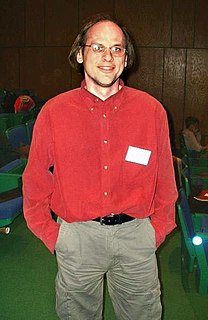A Quote by Howard Whitley Eves
It is impossible to overstate the imporance of problems in mathematics. It is by means of problems that mathematics develops and actually lifts itself by its own bootstraps... Every new discovery in mathematics, results from an attempt to solve some problem.
Related Quotes
Mystery is an inescapable ingredient of mathematics. Mathematics is full of unanswered questions, which far outnumber known theorems and results. It's the nature of mathematics to pose more problems than it can solve. Indeed, mathematics itself may be built on small islands of truth comprising the pieces of mathematics that can be validated by relatively short proofs. All else is speculation.
Mathematical thinking is not the same as doing mathematics - at least not as mathematics is typically presented in our school system. School math typically focuses on learning procedures to solve highly stereotyped problems. Professional mathematicians think a certain way to solve real problems, problems that can arise from the everyday world, or from science, or from within mathematics itself. The key to success in school math is to learn to think inside-the-box. In contrast, a key feature of mathematical thinking is thinking outside-the-box - a valuable ability in today's world.
A chess problem is genuine mathematics, but it is in some way "trivial" mathematics. However, ingenious and intricate, however original and surprising the moves, there is something essential lacking. Chess problems are unimportant. The best mathematics is serious as well as beautiful-"important" if you like, but the word is very ambiguous, and "serious" expresses what I mean much better.
Mathematics is the art of explanation. If you deny students the opportunity to engage in this activity-- to pose their own problems, to make their own conjectures and discoveries, to be wrong, to be creatively frustrated, to have an inspiration, and to cobble together their own explanations and proofs-- you deny them mathematics itself.
The broader the chess player you are, the easier it is to be competitive, and the same seems to be true of mathematics - if you can find links between different branches of mathematics, it can help you resolve problems. In both mathematics and chess, you study existing theory and use that to go forward.
Mathematics has two faces: it is the rigorous science of Euclid, but it is also something else. Mathematics presented in the Euclidean way appears as a systematic, deductive science; but mathematics in the making appears as an experimental, inductive science. Both aspects are as old as the science of mathematics itself.
The first and foremost duty of the high school in teaching mathematics is to emphasize methodical work in problem solving...The teacher who wishes to serve equally all his students, future users and nonusers of mathematics, should teach problem solving so that it is about one-third mathematics and two-thirds common sense.
Mathematics can have its problems, but it's actually hasn't seen a lot of the problems as some of the other sciences and so much of it in what people are doing is completely useless. Nobody kind of in really cares very much. You don't really have kind of right and left and people in ideology coming in because there isn't any. It just doesn't actually connect up to the kinds of things that people ideologically worry about. So most of mathematics just doesn't tell you anything one way or another about global warming or about healthcare or about any number of things that you might care about.


































